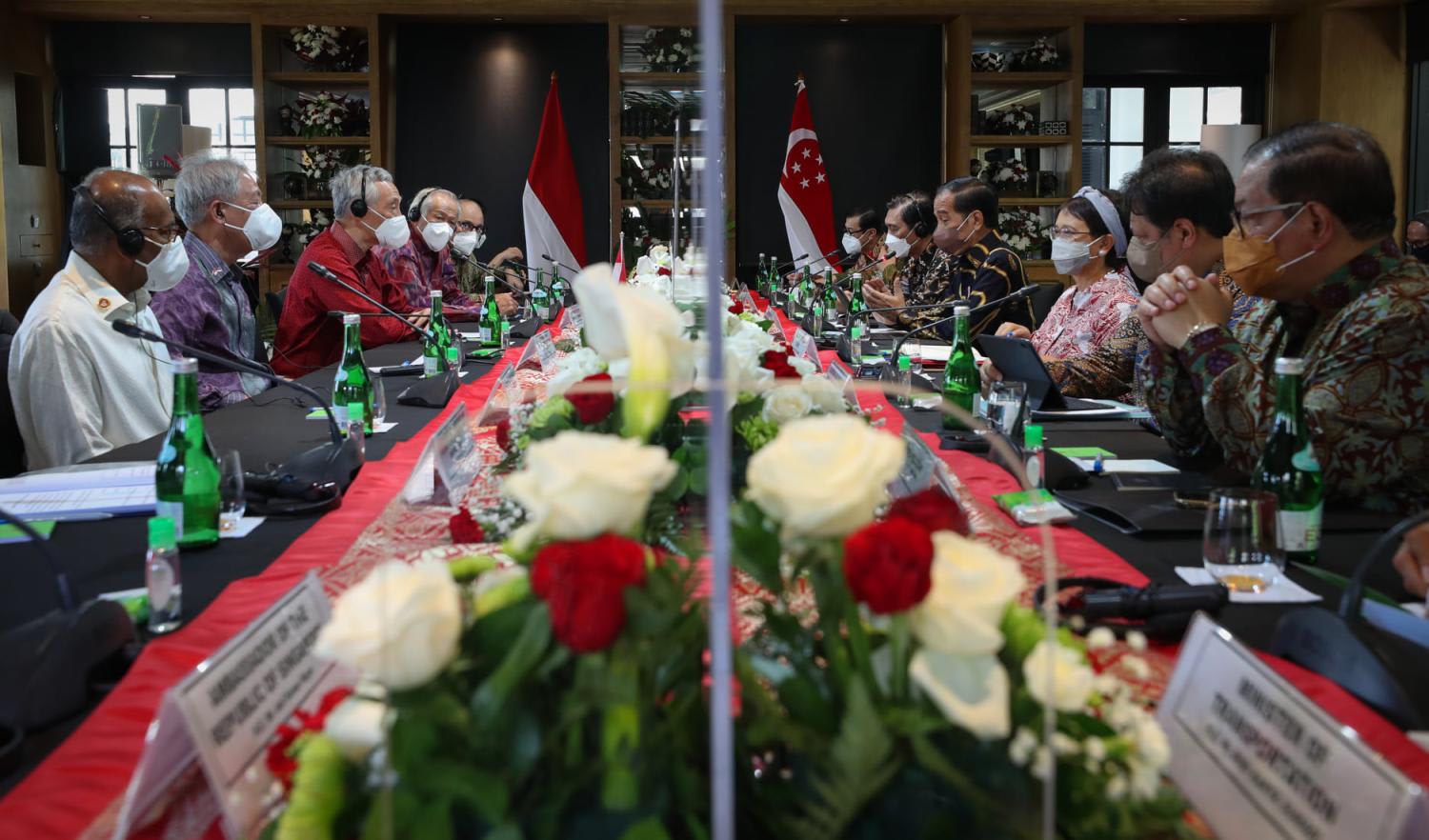 |
| Prime Minister Lee Hsien Loong (centre left) and Indonesia president Joko Widodo, flanked by Cabinet ministers, meet at the fifth Singapore-Indonesia Leader's Retreat on Jan 25, 2022. |
September 8, 2022
SINGAPORE — Singapore welcomes Indonesia's ratification of the Agreement on the Realignment of the Boundary between the Jakarta Flight Information Region (FIR) and the Singapore FIR, the Ministry of Foreign Affairs (MFA) said on Thursday (Sept 8) in response to media queries.
Under the FIR agreement, signed in January at the Singapore-Indonesia Leaders’ Retreat in Bintan, Indonesia will delegate to Singapore the provision of air navigation services in portions of the airspace within the realigned Jakarta FIR.
The agreement will remain in force for 25 years and shall be extended by mutual consent if both parties find it beneficial to do so.
SINGAPORE — Singapore welcomes Indonesia's ratification of the Agreement on the Realignment of the Boundary between the Jakarta Flight Information Region (FIR) and the Singapore FIR, the Ministry of Foreign Affairs (MFA) said on Thursday (Sept 8) in response to media queries.
Under the FIR agreement, signed in January at the Singapore-Indonesia Leaders’ Retreat in Bintan, Indonesia will delegate to Singapore the provision of air navigation services in portions of the airspace within the realigned Jakarta FIR.
The agreement will remain in force for 25 years and shall be extended by mutual consent if both parties find it beneficial to do so.
A country's FIR is a civil aviation demarcation managed by its air traffic service and does not necessarily follow territorial boundaries.
Singapore Prime Minister Lee Hsien Loong said after the leaders' retreat that the FIR pact would ensure that air traffic control services are provided safely, while allowing Changi Airport to grow in the long term as an international air hub.
The agreement realigns the FIR boundaries to be “generally in accordance” with Indonesia's territorial boundaries, Mr Lee had said.
Transport Minister S Iswaran also noted in Parliament in February that the FIR Agreement would support the continued growth and competitiveness of Singapore’s air hub and aviation-related sectors.
Mr Iswaran said then that the agreement "decisively resolves" a longstanding issue that had been on the bilateral agenda.
Previously, Indonesia had repeatedly expressed its wish to take over control of the FIR above Riau islands, which has been managed by Singapore since 1946 as mandated by the International Civil Aviation Organization.
Singapore had repeatedly said that the FIR was not an issue of sovereignty, but of the safety and efficiency of commercial air traffic.
TWO REMAINING AGREEMENTS TO BE RATIFIED
Two other agreements — relating to extradition and defence cooperation — were also signed at the leaders' retreat in January.
In Thursday's statement, the MFA spokesperson added that the Singapore and Indonesian governments had exchanged letters undertaking to bring all three agreements, including the one on FIR, into force at the same time.
"We look forward to the ratification of the remaining agreements so as to enable the simultaneous implementation of all three agreements," MFA added.
Under the Extradition Treaty, Singapore and Indonesia will grant extradition for a comprehensive list of extraditable offences covered by the treaty, in accordance with the laws of both countries.
The Defence Cooperation Agreement will strengthen the strategic relationship between both defence establishments, and the Singapore Armed Forces (SAF) and Indonesian National Armed Forces, by enhancing cooperation and promoting closer interaction between both armed forces.
Senior Minister Teo Chee Hean told Parliament in February that the three agreements must enter into force simultaneously to reduce misunderstandings and form a strong basis for future cooperation.
CNA
[And it is possible that the Indonesian Parliament will pick and choose which agreements to ratify, and then in future Singapore will inform Indonesia that because the other two agreements were not ratified, none of the three agreements are in force.]
No comments:
Post a Comment